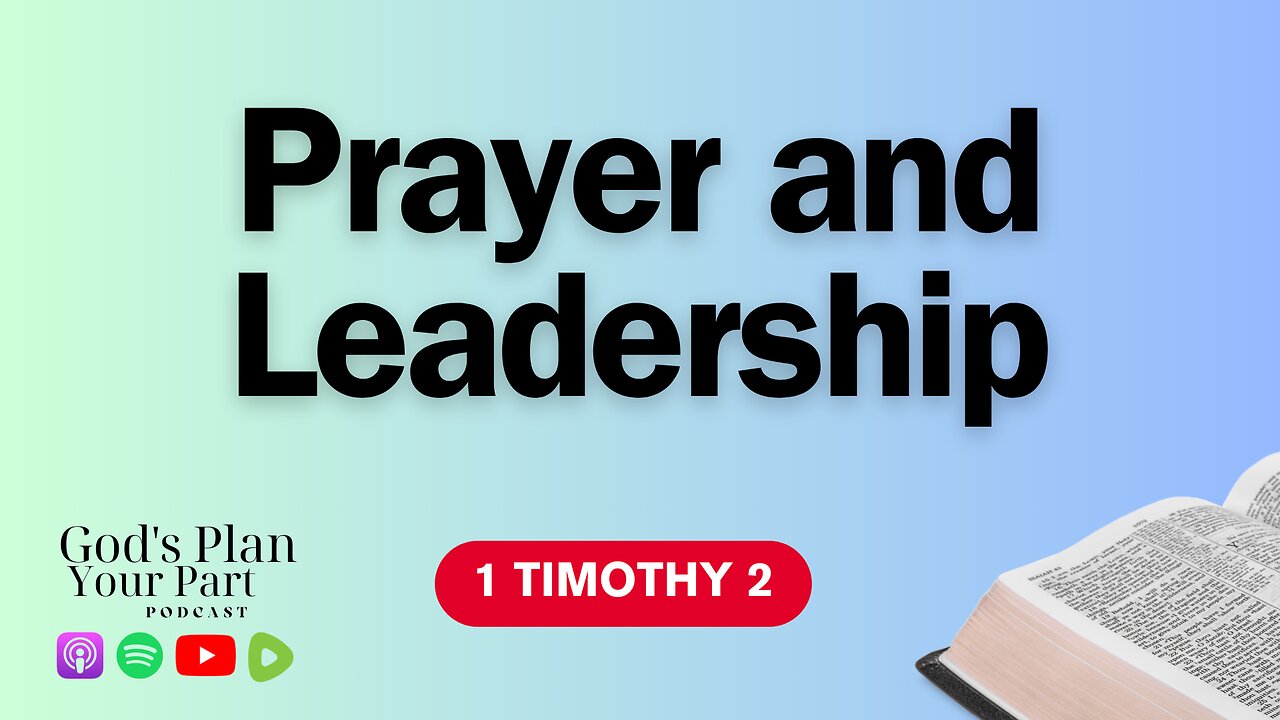Premium Only Content

1 Timothy 2 | Men, Women, and Church Leadership
What does the Bible say about praying for leaders?
Can women teach in the church according to 1 Timothy?
What is the significance of "childbearing" in 1 Timothy 2?
The passage from 1 Timothy 2 presents a comprehensive guide on prayer, church leadership, and behavior, emphasizing the roles of both men and women within the Christian community. Paul urges believers to pray for everyone, especially those in authority, to lead peaceful lives. This call to prayer sets a foundational principle for Christian engagement with secular governance, suggesting that believers should intercede for their leaders.
Paul's instructions extend to church practices, recommending that men actively lead in prayer, symbolizing their role in spiritual leadership within the church. This directive highlights a need for men to be actively involved in spiritual matters, a call that contemporary churches often grapple with due to a perceived or actual absence of male spiritual leadership.
The passage also addresses women, advocating for modesty in appearance and behavior, which has been a point of contention and discussion regarding women's roles in church and society. Paul's advice isn't merely about outward appearance but reflects an inward disposition of humility, respect, and dedication to good works, challenging modern interpretations of empowerment and self-expression.
Paul's prohibition against women teaching or having authority over men in church settings has sparked extensive debate. His appeal to the order of creation suggests a theological basis for this instruction, rather than a cultural one. This part of the scripture has led to various interpretations and practices concerning women's roles in church leadership, often dividing opinions on gender roles in ministry.
Finally, the mention of salvation through childbearing has puzzled many, but it might refer to the role of women in nurturing life—literal and spiritual—illustrating a long-term commitment akin to discipleship. This could symbolize the ongoing nurture and care akin to raising children, which reflects the continuous growth and care needed in spiritual development. This interpretation offers a broader understanding beyond literal childbirth, encompassing the spiritual and nurturing roles women might undertake in their faith journey.
#ChristianPrayer #ChurchLeadership #FaithAndFamily #BiblicalWisdom #ChristianLiving #1TimothyStudy #NewTestamentDaily #PaulineEpistles #ChristianDoctrine #BiblicalRoles
We use Logos Bible Software for our show prep.
Get 5 Free Digital Books and 10% Off
https://partner.logosbible.com/click.track?CID=431490&AFID=564660
Or Get the Fundamentals package for only $50
https://partner.logosbible.com/click.track?CID=431490&AFID=564660
Support the Show: https://www.buzzsprout.com/2105752/support
Contact Us: https://www.buzzsprout.com/twilio/text_messages/2105752/open_sms
Check out God’s Whole Story: https://www.buzzsprout.com/1565267/share
Ryan works for Men of Iron, a Men's Ministry focused on Mentorship. If you'd like to have a mentor or become one, click here: https://menofiron.org/
Read Some of My Articles on Medium: https://medium.com/@zook6939
Listen on Apple Podcasts: https://podcasts.apple.com/us/podcast/gods-plan-your-part/id1662005086
Listen on Spotify: https://open.spotify.com/show/2IjaYq4cYgy8WIcw5zWj9g
Instagram: https://www.instagram.com/godsplanyourpart/
Facebook: https://www.facebook.com/godsplanyourpart/
Contact us: godsplanyourpart@gmail.com
-
 14:39
14:39
Gods Plan Your Part
10 days agoTitus 1 | Paul’s Blueprint for Faithful Leaders
191 -
 10:46
10:46
Degenerate Jay
9 hours agoThe Rejected Superman Ending Of Smallville Would Have Changed Everything
1.65K2 -
 19:01
19:01
Jamie Kennedy
8 hours agoWe're in a World of Dummies! | From Ep. 176 Hate to Break It To Ya w/ Jamie Kennedy
1.48K -
 3:54
3:54
BIG NEM
16 hours agoWelcome to #NEMSWORLD UNCUT. The World's First Uncensored Sketch Comedy Podcast.
19 -
 LIVE
LIVE
Price of Reason
10 hours agoElon Musk TARGETED By Hollywood & MSM! Yellowstone DISAPPOINTS! Dragon Age Veilgard DISASTER!
4,345 watching -
 5:03:12
5:03:12
Akademiks
6 hours agoLil Durk Pleads NOT GUILTY and Hires NBA Youngboy Lawyer To Represent him! Lil Baby tryna comeback?
88.8K14 -
 3:27:19
3:27:19
SNEAKO
7 hours agoSNEAKO X JACE!
67.6K7 -
 57:42
57:42
The Charlie Kirk Show
7 hours agoTHOUGHTCRIME: Clash of the Cabinet Edition
136K32 -
 1:04:59
1:04:59
Man in America
10 hours agoThe Dark Truth Behind Sunscreen, Cancer, Pharmakeia & Doctor Worship w/ Jonathan Otto
43.1K9 -
 49:35
49:35
PMG
1 day ago $7.11 earned'Ukraine and the Giant Distraction!"
33.5K9